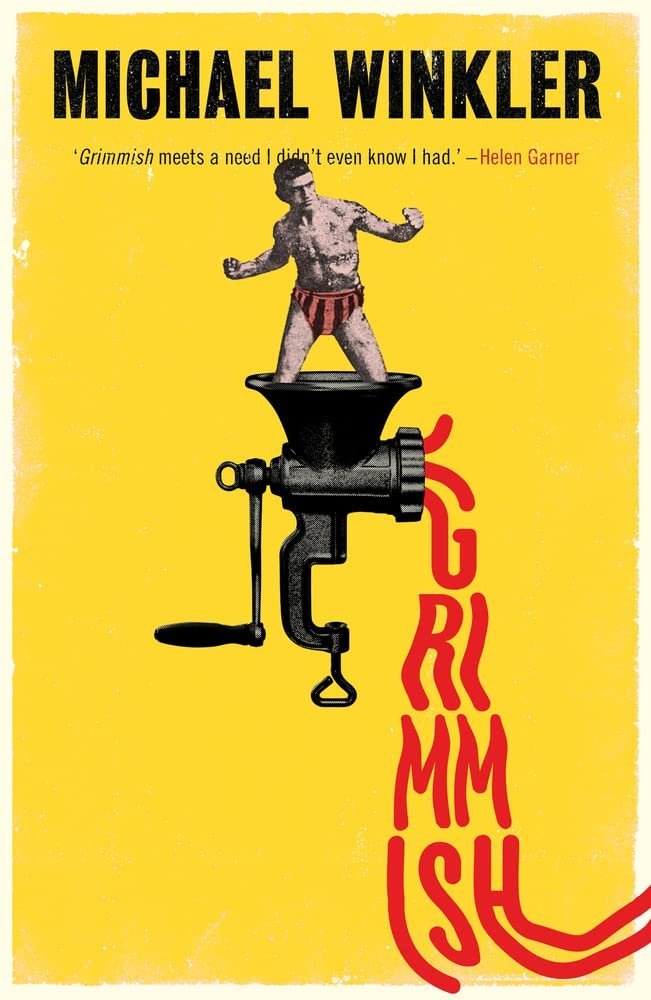GRIMMISH
Pain was Joe Grim’s self-expression, his livelihood and reason for being. In 1908-09 the Italian-American boxer toured Australia, losing fights but amazing crowds with his showmanship and extraordinary physical resilience. On the east coast Grim played a supporting role in the Jack Johnson-Tommy Burns Fight of the Century; on the west coast he was committed to an insane asylum. In between he played with the concept and reality of pain in a shocking manner not witnessed before or since.
Michael Winkler braids the story of Grim in Australia and meditations on pain with thoughts on masculinity and vulnerability, plus questionable jokes, in a haymaker of experimental non/fiction.
JM Coetzee: “The strangest book you are likely to read this year.”
Helen Garner: "Grimmish meets a need I didn't even know I had. I lurched between bursts of wild laughter, shudders of horror, and gasps of awe at Winkler’s verbal command: the freshness and muscle of his verbs, the unstoppable flow of his images, the bizarre wit of the language of pugilism—and all the while, a moving subterranean glint of strange masculine tenderness."
Emmett Stinson, Overland: “Grimmish is probably the most unusual Australian book I will read in 2021, and, without a doubt one of the best.”
Beejay Silcox: “All the makings of a cult classic. It’s grotesque and gorgeous, smart and searching.”
Robbie Millen, The Times (London): "Playful, touching, eccentric, full of feeling…a blast against publishing by numbers."
Victor Ladis Shultz, Chicago Review of Books: "Witness the jagged recursion of the narration, the startling vocabulary, the exhaustive study of pain and pugilism and privation presented through outside quotation, interpolated poetry, and archived news copy…I describe it as a haymaker to the temple."
Ben Lindner, Beyond the Zero podcast: “Probably the Australian novel of the decade.”
Wall Street Journal: "Rambunctious."
Jose Valenzuela, Revista Mercurio (Spain): “The author leaves us amazed by the speed with which he alternates fragments that recall, as we have just said, the prose and interests of Cormac McCarthy, with others that evoke the work of Enrique Vila-Matas (both mentioned in some of his many footnotes), and then something with the flavour of Samuel Beckett.”
Oliver Mol, SRB: "One of those rare narratives that delights and repulses and hums with such madness and integrity that we wish, at its conclusion, only to return to our desks and to forget all the writing rules we were taught at school."
Bram Presser: “Blazing its own trail of experimental weirdo mindfuckery…the most daring book of (the year).”
Reuben Mackey, Meanjin: "...recalls W.G. Sebalds's melding of fiction with his personal history, as well as the more exuberant postmodern playfulness of David Foster Wallace or Thomas Pynchon."
Robbie Arnott: "Playful, visceral and elegant. Sat down to read it, lost an afternoon.”
Greg Gerke: “A novel that takes chances, that animates a hazily documented life and bleeds it into a strange music called fiction. It’s Stein, Gass, McCarthy, and Pynchon rolled into one exquisite cannoli.”
Jock Serong: “What a gem this is: funny, sad and fascinating – but more than anything else, the writing is superb. I hit the back cover at speed and nearly went clean through it.”
Published in Australia by Puncher & Wattmann
Published in UK by Peninsula Press
Published in North America by Coach House Books
Published in Spanish translation by Mutatis Mutandis




